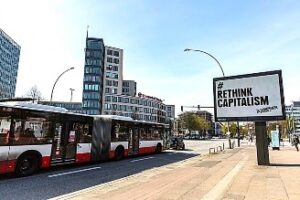The nature of capitalism
Jason Hickel

People often assume that capitalism is defined by “markets and trade”. But markets and trade existed for thousands of years before capitalism did.
Capitalism is only 500 years old. So what is distinctive about this economic system? Three things (well, more, but three for now):
1. First, and most importantly, it is defined by enclosure and artificial scarcity. The origins of capitalism lie in a systematic effort by elites to restrict people’s access to commons and independent subsistence, in order to render them reliant on wage labour for survival.
Over the past 500 years, this has taken the form of privatization of commons, forced dispossession, destruction of subsistence economies and – particularly in the colonies taxing people in a currency they do not have in order to induce them to seek wages in that currency.
This continues today, with attempts to ensure an artificial scarcity of access to essential goods such as housing, healthcare, education, transit, and so on goods that could very easily be provided, at high quality, on a universal public basis.
Where universal public goods do exist, these have usually been won by longstanding struggles by labour movements and other progressive forces (including the anti-colonial movement).
2. Second, capitalism is organized around and dependent on perpetual expansion, meaning ever-increasing production of commodified goods. It is the only intrinsically expansionary economic system in history (meaning it basically has a crisis if it doesn’t continually expand).
Crucially, under capitalism the purpose of increasing production is *not* primarily to meet human needs, but rather to extract and accumulate profit. That is the overriding objective (and it is also the main objective of innovation).
It’s important to distinguish here between small businesses, which quite often operate with a steady-state, usevalue logic (and which obviously preceded capitalism), and corporations whose main objective is expansion and accumulation (which define the capitalist era).
To sustain the process of perpetually increasing surplus accumulation, capital requires an ever-rising quantity of inputs (labour and nature), and requires that these inputs be obtained as cheaply as possible.
This introduces a constant pressure to depress real wages and attack environmental protections wherever possible (in the absence of countervailing political forces). The result is a system that, left to itself, automatically generates inequality and ecological breakdown.
3. Finally, capitalism is notable for precluding democratic decision-making. Even in countries that prize political democracy, democratic principles are rarely allowed to operate in the sphere of production, where decisions are made overwhelmingly by those who control capital.
The result is that decisions about what to produce, for what purposes, for whose benefit, and under what conditions are generally made in the narrow interests of the capitalist class (the workers, people actually *doing* the production, rarely get a voice at all).
It is worth pondering how our production priorities (and our treatment of labour and nature) might be different under conditions of economic democracy. Existing evidence suggests that democratic conditions lead to less exploitation, more equality, and more care for ecology.
In sum, the tendency to equate capitalism with “markets and trade” naturalizes a system that is not natural, and prevents us from having a clear-eyed view of how it operates and how we might want to do things differently.(The “more” I referred to involves exploitative relations of race, gender and imperial power, which are effects of the tendencies described here, and which sustain them, but this deserves a thread unto itself coming in the near future).
We can have a democratic economy organized around meeting human needs at a high standard, where production is socially just and ecologically regenerative. Such a system is possible, but it will require a political movement to bring it into being.
From a Twitter posting, 18 Apr, 2022: https://twitter.com/jasonhickel/status/151597748110915587?lang=en

Dr Jason Hickel is an economic anthropologist, a professor at ICTA-UAB, visiting Senior Fellow at LSE, and chair professor of Global Justice and the Environment at the University of Oslo. He has authored many articles and books, including The Divide, and Less is More.



























